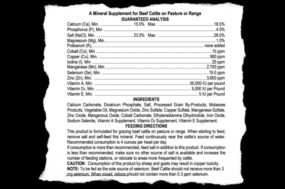Prior to the conference on March 11-13, AFIA’s Spring Committee Meetings provided time for the association’s committees and Board of Directors to meet. A highlight of the Spring Committee Meetings was the pre-conference Nutrition Symposium, presented March 12 by the Nutrition Council.
The afternoon-long seminar, “Sustainable Technologies: Short Term and Long Term Opportunities,” provided an overview of sustainable technologies impacting today’s farmers and ranchers. Featured experts included Dr. Juan Tricarico, Innovation Center for U.S. Dairy, Dr. Judith L. Capper, Washington State University, Dr. Jason Clay, World Wildlife Fund and Dr. Xingen Lei, Cornell University.
Dr. Jude Capper described how every production system (not just natural, organic or grass-fed) can be sustainable.
Losses within dairy and beef production systems directly influence the environmental impact of a particular system, livestock sustainability Capper explained. Nutrition, morbidity, mortality, parasites, poor reproduction, antibiotic residues, carcass defects and feed shrink all play a role in animal agriculture’s carbon footprint.
Addressing the frequently-asked question about feeding a growing global population, Dr. Jason Clay stated that the challenge in the next 40 years would be to produce as much food as the world has had over the last 8,000 years with the same or fewer resources. In addition to population, income will also lead to an increase in food consumption.
“We are mining the planet right now, or rather, we are eating the planet,” said Clay, explaining we are living off of natural resources faster than they are able to regenerate.
Dr. Xingen Lei shed light on how one particular animal feed supplement, algae, has the potential to improve human food security, convert pollutants into a renewable fuel and make agriculture more sustainable.
According to Dr. Juan Tricarico, reducing greenhouse gas emissions for fluid milk 25 percent by 2020 will require the efforts of the entire dairy value chain, from farm to retail. Among the stakeholders, suppliers, dairy producers, cooperatives, processors and manufacturers, transportation, retail, government and non-governmental institutions must strategically work together to achieve this goal.
More than 530 attendees from the livestock feed and pet food industry attended PISC to learn about the latest issues, events and other matters. The Nutrition Symposium has been approved for four continuing education units (CEUs) by the American Registry of Professional Animal Scientists, while PISC has been approved for nine CEUs.
The 2014 Spring Committee Meetings, Nutrition Symposium and Purchasing and Ingredient Suppliers Conference will be hosted March 12-14 in Las Vegas, Nevada. ![]()
— AFIA news release






